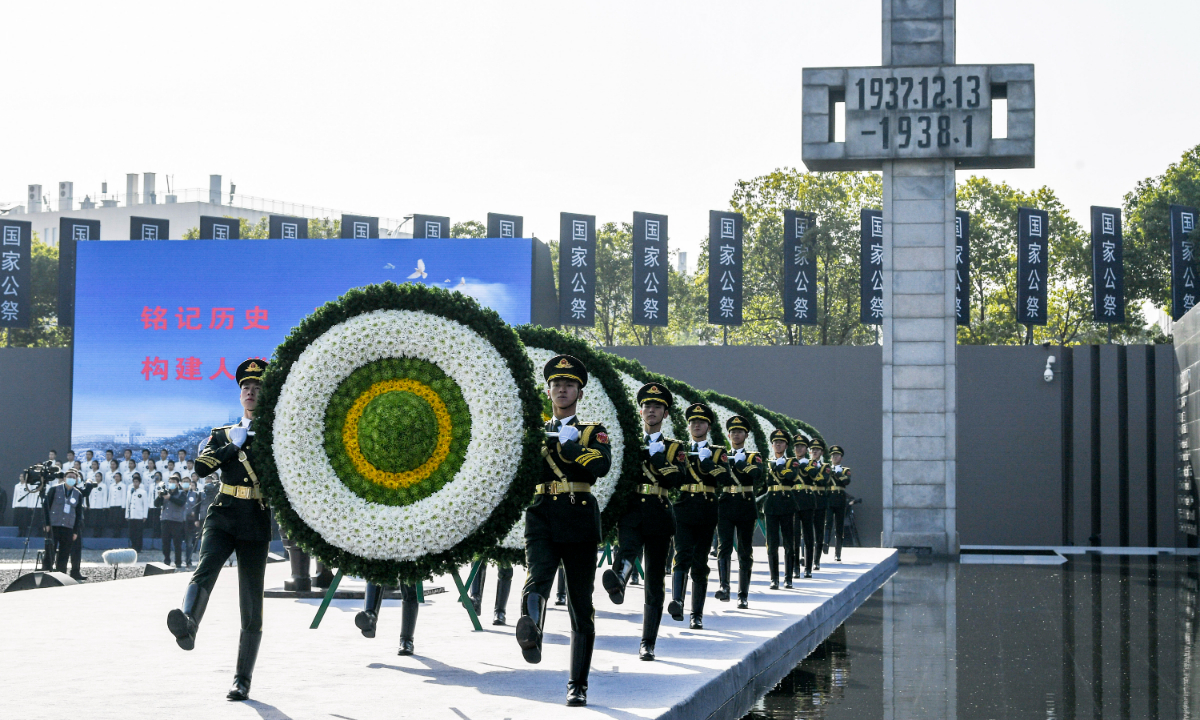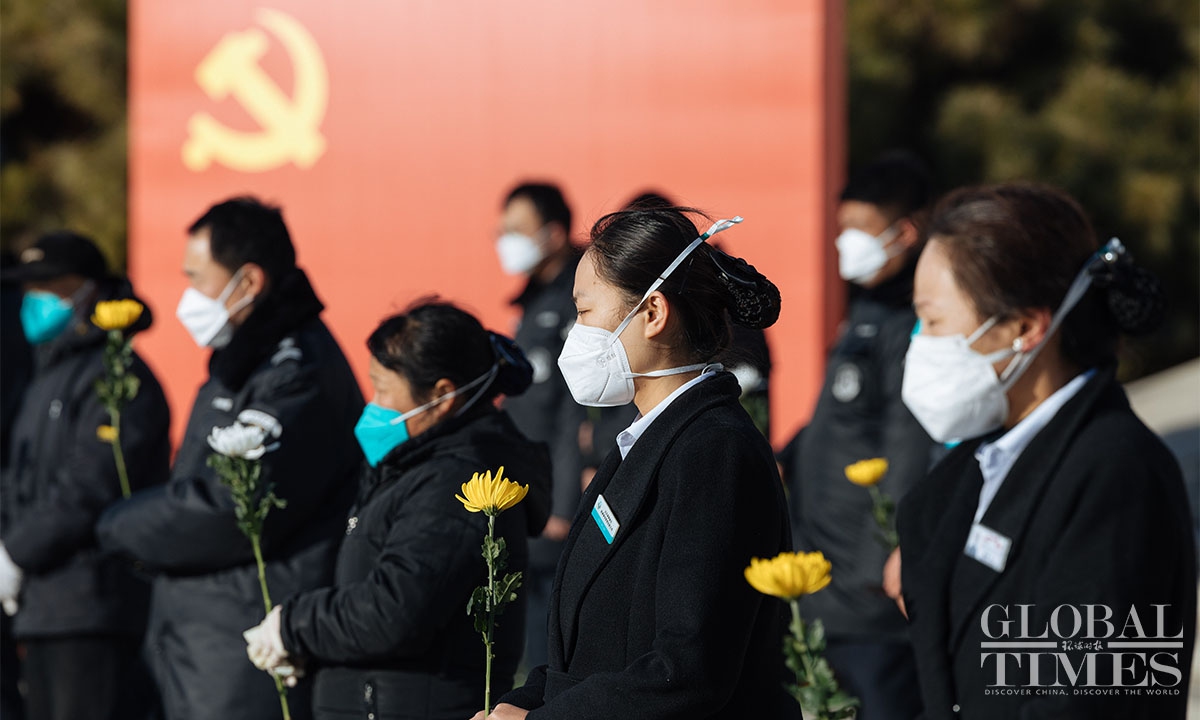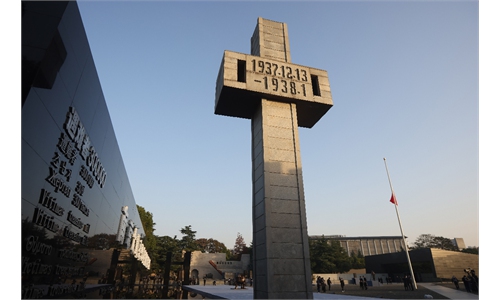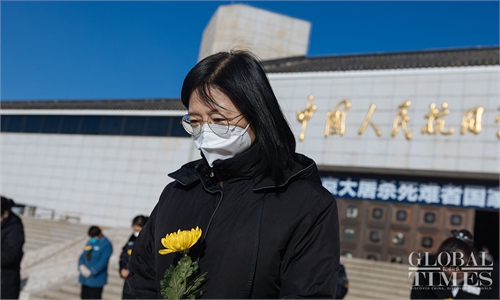China commemorates Nanjing Massacre victims amid Japan’s militaristic moves
Neighbors alarmed as Japan’s revised security strategy indicates major policy shift

China holds its ninth national memorial ceremony for the Nanjing Massacre victims at the Memorial Hall of the Victims in Nanjing Massacre by Japanese Invaders in Nanjing, capital of East China's Jiangsu Province on December 13, 2022. Photo: Xinhua
On early Tuesday morning, China's national flag was raised and then lowered at half-mast by PLA soldiers at the Memorial Hall of the Victims in Nanjing Massacre in Nanjing, capital city of East China's Jiangsu Province.
The memorial ceremony begun with air-raid sirens blaring throughout Nanjing at exactly 10:01 am. Thousands of people who attended the ceremony and pedestrians paused and observed for a minute of silence and drivers stopped their vehicle and honked.
During the ceremony, teenage students read out a declaration of peace to deliver the message of peace and love to the country and the world.
In a speech addressing the ceremony, Cai Qi, a member of the Standing Committee of the Political Bureau of the CPC Central Committee, called the Nanjing Massacre a horrendous crime against humanity and a very dark page in the history of mankind.
When referencing China-Japan relations, Cai said that exchange and cooperation in various fields have yielded fruitful results, bringing important benefits to the two peoples and promoting regional peace, development and prosperity since the normalization of China-Japan relations 50 years ago.
China and Japan should treat each other in a sincere manner, draw on historical experience, grasp the general direction of bilateral relations from a strategic height and build a China-Japan relationship that meets the demands of the new era, Cai added.
Over 300,000 victims were brutally killed by Japanese troops after the city of Nanjing was captured by Japanese invaders on December 13, 1937.
A total of 1,756 survivors of the Nanjing Massacre were recorded in 1987 when the first statistics were collected. But over time, the number of historical witnesses dwindled substantially. Seven survivors of the massacre have passed away in 2022, leaving the number of registered survivors of the massacre to only 54.

Photo: Li Hao/GT
Tokyo's policy shift
In recent years, the right-wing forces in Japan have constantly distorted and denied history, denied the existence of the Nanjing Massacre, and even attempted to revise the pacifist Constitution, undermining peace and stability in the Asia-Pacific region.
The Japanese media have maintained silent on China's national memorial ceremony in Nanjing on Tuesday but widely discussed the approval of the Japanese government's draft revisions of three key national security documents - the National Security Strategy, the National Defense Program Guidelines and the Medium-Term Defense Program.
Observers called the revised documents on national security a major shift from Japan's defensive policy since the end of World War II as they clearly state that Japan will possess counterstrike capabilities to strike enemy missile launch sites, acquire foreign-made missiles -- with the US-made Tomahawk cruise missile in mind, greatly increase defense spending, and call China the "greatest strategic challenge."
Japan has made preparations for major policy changes by hyping "outside threats," including the missile tests in North Korea and the Russia-Ukraine conflict. It also accused China's military activities in the South China Sea and East China Sea and around the island of Taiwan.
The revised documents emphasized Japan's strategic aims of merging its own security policies with the US' Indo-Pacific Strategy and attempting to defy the pacifist Constitution and abolish the military restrictions, Song Zhongping, a Chinese military expert, told the Global Times.
Purchasing the Tomahawk cruise missile and deploying standoff missiles that can be launched from beyond enemy range demonstrated that Japan's military strategy is changing, and it is not satisfied with simply purchasing more weapons, but is attempting to develop its own cruise missiles, said Song, warning that Japan's ambition may grow alongside its militarism.
The US' attempt to expand NATO into Asia or create an Asian version of NATO has also emboldened Japan to expand its military, analysts said, noting that the US has intensified cooperation with Japan, South Korea, Australia and New Zealand in the Asia-Pacific region and in June, Japanese Prime Minister Fumio Kishida was invited to attend the NATO summit for the first time.
However, Japan is an abnormal country because of the calamities it brought to neighboring countries during the war, as well as its refusal to reflect on or admit historical mistakes. This is also why Asian nations are concerned about the rise of right-wing conservative forces in Japan, said Song.
The Japanese government's recent moves have incurred domestic protests. For example, around 1,500 people rallied in Tokyo on Thursday against the increase of defense budgets and tax hikes planned by the government.
Given the devastation caused by Japan's prior defense and military upgrading in history, particularly during the WWII, the present policy change will have an influence on the whole area, as many nations will have to raise military spending, leading to a new round of arms race in Northeast Asia, Da Zhigang, director of the Institute of Northeast Asian Studies at Heilongjiang Provincial Academy of Social Sciences, told the Global Times.
These changes will also have an impact on China-Japan ties, since Japan's China strategy will tilt more toward the US and NATO by classifying China as a "challenge," and bilateral relations will be developed in a confrontational tone, making it more difficult to handle conflicts, said Da.
Responding to Japan's recent negative moves, Chinese Ambassador to Japan Kong Xuanyou said at a forum on December 8 that Japan should solve its problems on its perception of China and return to rationality to fully implement consensus that China and Japan are partners not threats to each other.
Japan describing China as a challenge also goes against the four China-Japan political documents, which clarified that the two countries should "be partners, not threats," Xiang Haoyu, a research fellow at the China Institute of International Studies, told the Global Times.
This year marked the 50th anniversary of the normalization of China-Japan ties. Instead of abandoning the peaceful road at this critical juncture, Japan should learn from the bitter experiences of bilateral ties in history, said Xiang, noting that we can ask some questions to the Japanese government: what signal Japan wishes to send by labeling China a "challenge"? What direction does it wish to take in bilateral relations? Does Japan wish to face military clashes with China in the future as a neighbor?



